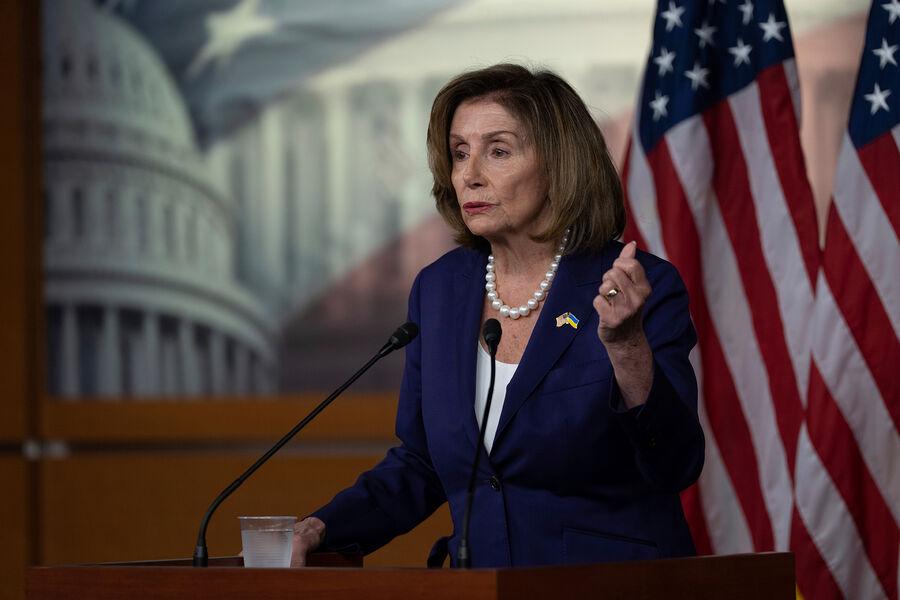Why Taiwan matters for US? Following Pelosi's visit
The US House of Representatives Speaker Nancy Pelosi's unofficial visit to Taiwan is quite an intriguing event this week in light of the rather strained Sino-American relations. Information about her possible visit to the island appeared in the media as early as last week, on the eve of her tour of the Asia-Pacific region, and literally, at once the situation around Taiwan sharply escalated. China openly demonstrated its dissatisfaction with Pelosi's aspirations by launching four fighter jets into the identification zone of Taiwan's air defence system and initiating a test of the DF-17 hypersonic missile system 120 kilometers from the island. The US response was also short-lived, with US aircraft carriers reportedly sailing to the island.
But all this US-Chinese hysteria did not prevent the successful arrival of the third-ranking US politician in Taiwan, the purpose of which she previously told The Washington Post, presenting her visit as an expression of US solidarity with Taiwan. According to Pelosi, the United States cannot stand by while China threatens the island and democracy.

It should be noted that in recent decades this is the first visit to Taiwan by such a high-ranking American diplomat, although the problem of the island periodically pops up in US-Chinese relations.
Officially, the US does not recognize its independence, but it continues to maintain close contact with Taipei. Moreover, Washington supplies arms to Taiwan and supports the strengthening of the self-defense forces, which certainly adds to the tension in relations with Beijing. Incidentally, during a recent phone conversation between the US and Chinese presidents, Xi Jinping warned US policymakers against playing with fire, in fact openly expressing his dissatisfaction with US interference in the Taiwan issue. Curiously, Joe Biden himself had previously said that Pelosi's visit to Taiwan was not a good idea.
At the same time, Washington has a controversial policy on Taiwan. Although the United States does not recognize the island's independence, it conducts training courses for Taiwan's military in the country. Moreover, the White House has openly declared its readiness to provide direct military assistance to the island in the event of a clash with China. In particular, in May 2022, President Biden confirmed this during a press conference in Tokyo in response to a journalist. The American leader's revelations are unlikely to have been overlooked in Beijing; therefore, the Chinese side may have raised this key point for Beijing during the last phone conversation between the two heads of state.
However, given China's "soft power" policy, it is unlikely that the current escalation around Taiwan, despite Beijing's threats of an imminent military response to Nancy Pelosi's visit to Taipei, could escalate into a hot phase. Roughly speaking, Sino-American relations did not deteriorate yesterday - this crisis is at least twenty years old. The US periodically uses the long-standing Taiwan issue as a political tool to pressure China, but without crossing the "red lines" in bilateral relations. At this stage, the actualization of the problem by the states is rather related to the global processes taking place in the world and to the confrontation between the West and Russia, which is considered a strategic ally of China. At the same time, both the US and China probably understand that a direct clash between them will certainly lead to irreversible consequences on a global scale and may finally destroy the entire world economy. Accordingly, it is most likely that the US and China will limit themselves to "muscle-flexing" and threatening statements, which are usually part of the policy of any state that has the image of a superpower for a long time.
Of course, a number of factors have contributed to the marked deterioration of China-US relations, mainly the struggle for influence in Asia and the Indo-Pacific region, India's involvement in the conflict, the trade war between the two competing powers, which in recent years has actually turned into a US struggle against Chinese economic growth, especially after the increase in US import duties on Chinese high-tech products.
It is known that the trade war with China was unleashed by the administration of former US President Donald Trump as one way to contain the PRC. In 2018, duties of $370 billion were imposed on imports of Chinese goods. In this way, the US technology industry reduced its dependence on goods from China, filling this gap with increased imports from Taiwan, South Korea, Vietnam, and other countries. However, as we can see, the current President Joe Biden is pursuing a similar policy; at least to this day, the United States has not yet decided to repeal some of the American customs duties on imports from China. And this is a significant enough nuance that points to serious competition in US-Chinese relations.
Commenting on processes currently taking place around Taiwan, Kazakhstani expert, and expert on Central Asia Vyacheslav Shekunskikh told Caliber.Az that the scenario of the current US actions is similar to what was happening a few months before the Russian special operation.

"This is an escalation, an aggravation of the situation and an attempt to accelerate those processes that can go their own way, kind of evolutionary," the Kazakhstani political scientist argues. - China is never in a hurry. And right now it does not need a military conflict. The US could provoke Beijing into an "awkward move" that would disrupt almost the post-war world order. What I mean is that two permanent members of the UN become aggressors in the eyes of the rest of the world. Now we see China "lightly" showing its teeth by conducting exercises with supposedly live-fire exercises near Taiwan. But at the same time, it carefully avoids direct contact with both Taiwanese and any other armed forces. Probably the PRC is now one of the few countries that will try to preserve the system that evolved after World War II. Up to a certain point, of course. In Washington, apparently, they are not ready for a sharp break of the system, but the motive is as follows: as long as the process of reformatting the world economic system is launched globally. It is obvious that the US is provoking China to aggression. But Taiwan is now embedded into the global distribution of specialization, and everyone needs it at this stage," the expert said.
According to him, it is unlikely that the United States can afford a war that would cause Taiwan to fall out of these supply chains.
"The purpose of these games is to make China the aggressor, and the task, as I said, is to reformat the economic structure. By the way, not only the post-war structures will be sacrificed, but also the well-being of their own population. The US has a complex decision-making system. Under their law, officials can make visits to Taiwan. Taiwan could have been faced with the fact. The visit was clearly planned jointly with the Pentagon since a naval escort, ships, and the aircraft carrier Ronald Reagan were provided. Biden's recent call can be linked to Pelosi's visit and suggest that these are acts of the same play. But again, Biden does not have to be in the loop on this. As for the future of Taiwan, there are two scenarios. The first is an escalation when Beijing is persuaded to take tough action, and there will be accelerated integration of the island into PRC territory, either by force or in a kind of legitimized way. The second scenario is a special status for Taiwan that would suit everyone for a certain period of time. China is ready to wait, but whether it will be allowed to do so for years is doubtful," the expert concluded.
P.S. There is one more important detail in the end. Taiwan is a key player in the market of semiconductor technologies and produces about 65% of the world's chips. In addition to economic importance, the island is also significant from a strategic point of view. For the United States, maintaining its position on the island is essential, first of all, to curb China's growth in the region. Therefore, it is most likely that the US will continue to use the Taiwan factor as a lever of pressure on China.








